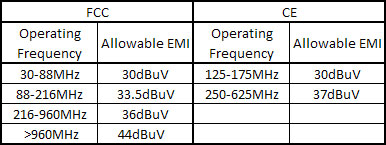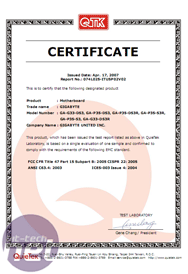Motherboard manufacturers are getting a shake up when it comes to Electro Magnetic Interference certifications after a batch of Gigabyte GA-P35-DS3 motherboards failed a recent retest for EMI certification from the FCC and CE.
EMI testing is a requirement of almost all electronic products sold in the US and the UK. Requirements for certification from the FCC and CE vary. The FCC and the CE EMI requirements are as follows:

Most electronic devices are designed to fall between these ranges but there's always those few that manage to slip through. Unfortunately for Gigabyte, the GA-P35-DS3 just happened to be one of those that managed to slip through only to be caught red handed on down the road. Three of the motherboards were submitted to the Electronics Testing Center in Taiwan for EMI testing. The results were surprising with three failed tests for EU and Taiwanese certification levels and two failing FCC regulations.
This of course could just be a bad batch of motherboards and the testing papers don't tell just where the motherboards came from. That makes it impossible to tell if they were pre-release testing versions (which sometimes don't meet all certification requirements) or if they were retail models. The Inquirer ran the story initially and got back a very interesting reply from Gigabyte.
 "All GIGABYTE motherboards undergo rigorous and thorough testing (including EMI testing) before being brought to market. Attached is GIGABYTE official certification for the GA-P35-DS3, where it clearly shows the GIGABYTE GA-P35-DS3 passing all EMI requirements.
"All GIGABYTE motherboards undergo rigorous and thorough testing (including EMI testing) before being brought to market. Attached is GIGABYTE official certification for the GA-P35-DS3, where it clearly shows the GIGABYTE GA-P35-DS3 passing all EMI requirements.
It seems a little strange that one of our top selling boards just so happened to have a negative report from the Taiwan ETC several months after the launch of the product. Any motherboard manufacturer or anyone else for that matter can pay to have EMI testing done from ETC. In this case, GIGABYTE has contacted ETC and they have confirmed to us that one of our competitors is actually the one who paid for the testing mentioned in the Inquirer article.
Not to impugn the integrity of the ETC, but any time you have research paid for by a competitor of the study's focus, it does beg the question of how accurate the "report" is. In all fairness, the fact that one of our competitor motherboard manufacturers paid for this report should have been mentioned in the article so readers can make up their own minds as to the accuracy. For example, as mentioned in the article, there is no information in the report about where the motherboard tested came from. Was this a sample purchased from a retail outlet? Were there any modifications made to the board before testing?
Clearly, this is a malicious act by a competitor to negatively impact GIGABYTE motherboard sales, and they have used the Inquirer to do so. Hopefully we can get a retraction or at the very least a clarification as the article has been picked up by several other websites and can have a serious negative impact on our motherboard sales."
The problem with this reasoning is that both Asus and MSI had boards that were included in the test and their boards passed all certification requirements. So if someone had managed to pay the ETC to fail competitor motherboards, Gigabyte would not have been the only target.
However, it does raise the question of who paid for the testing on these boards? It is quite possible that it wasn't Asus or MSI that paid for the test on Gigabyte's board and could be another competitor in the industry that requested boards from all three manufacturers were tested.
A motherboard itself failing an EMI test is not a cause for concern. A good metal case can negate any EMI being produced by a motherboard with no adverse effects on surround equipment but the regulations are there for a reason. If there were no regulations on the levels of EMI that an electronic device can produce then everything would interfere with everything else. When you're getting into the dozens of electronics devices that run simultaneously in the average household, that could end up being a very big problem.
Discuss in the forums.
EMI testing is a requirement of almost all electronic products sold in the US and the UK. Requirements for certification from the FCC and CE vary. The FCC and the CE EMI requirements are as follows:

Most electronic devices are designed to fall between these ranges but there's always those few that manage to slip through. Unfortunately for Gigabyte, the GA-P35-DS3 just happened to be one of those that managed to slip through only to be caught red handed on down the road. Three of the motherboards were submitted to the Electronics Testing Center in Taiwan for EMI testing. The results were surprising with three failed tests for EU and Taiwanese certification levels and two failing FCC regulations.
This of course could just be a bad batch of motherboards and the testing papers don't tell just where the motherboards came from. That makes it impossible to tell if they were pre-release testing versions (which sometimes don't meet all certification requirements) or if they were retail models. The Inquirer ran the story initially and got back a very interesting reply from Gigabyte.
 "All GIGABYTE motherboards undergo rigorous and thorough testing (including EMI testing) before being brought to market. Attached is GIGABYTE official certification for the GA-P35-DS3, where it clearly shows the GIGABYTE GA-P35-DS3 passing all EMI requirements.
"All GIGABYTE motherboards undergo rigorous and thorough testing (including EMI testing) before being brought to market. Attached is GIGABYTE official certification for the GA-P35-DS3, where it clearly shows the GIGABYTE GA-P35-DS3 passing all EMI requirements.It seems a little strange that one of our top selling boards just so happened to have a negative report from the Taiwan ETC several months after the launch of the product. Any motherboard manufacturer or anyone else for that matter can pay to have EMI testing done from ETC. In this case, GIGABYTE has contacted ETC and they have confirmed to us that one of our competitors is actually the one who paid for the testing mentioned in the Inquirer article.
Not to impugn the integrity of the ETC, but any time you have research paid for by a competitor of the study's focus, it does beg the question of how accurate the "report" is. In all fairness, the fact that one of our competitor motherboard manufacturers paid for this report should have been mentioned in the article so readers can make up their own minds as to the accuracy. For example, as mentioned in the article, there is no information in the report about where the motherboard tested came from. Was this a sample purchased from a retail outlet? Were there any modifications made to the board before testing?
Clearly, this is a malicious act by a competitor to negatively impact GIGABYTE motherboard sales, and they have used the Inquirer to do so. Hopefully we can get a retraction or at the very least a clarification as the article has been picked up by several other websites and can have a serious negative impact on our motherboard sales."
The problem with this reasoning is that both Asus and MSI had boards that were included in the test and their boards passed all certification requirements. So if someone had managed to pay the ETC to fail competitor motherboards, Gigabyte would not have been the only target.
However, it does raise the question of who paid for the testing on these boards? It is quite possible that it wasn't Asus or MSI that paid for the test on Gigabyte's board and could be another competitor in the industry that requested boards from all three manufacturers were tested.
A motherboard itself failing an EMI test is not a cause for concern. A good metal case can negate any EMI being produced by a motherboard with no adverse effects on surround equipment but the regulations are there for a reason. If there were no regulations on the levels of EMI that an electronic device can produce then everything would interfere with everything else. When you're getting into the dozens of electronics devices that run simultaneously in the average household, that could end up being a very big problem.
Discuss in the forums.

MSI MPG Velox 100R Chassis Review
October 14 2021 | 15:04









Want to comment? Please log in.